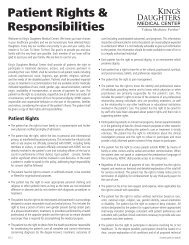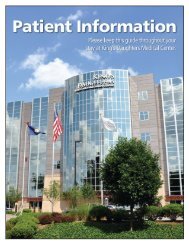The best in cardiac surgery - King's Daughters Medical Center
The best in cardiac surgery - King's Daughters Medical Center
The best in cardiac surgery - King's Daughters Medical Center
You also want an ePaper? Increase the reach of your titles
YUMPU automatically turns print PDFs into web optimized ePapers that Google loves.
4 CARDIOVASCULAR UPDATE KING’S DAUGHTERS HEART AND VASCULAR CENTER<br />
New recommendations for use of<br />
heart failure drug Nesiritide<br />
Nesiritide (Natrecor®) is a<br />
recomb<strong>in</strong>ant form of human-type<br />
natriuretic peptide (hBNP) that occurs<br />
naturally <strong>in</strong> the ventricles of the heart.<br />
Approved only for the treatment of acute<br />
decompensated heart failure (ADHF) <strong>in</strong><br />
patients with dyspnea at rest, it has<br />
previously been used <strong>in</strong> patients with<br />
vary<strong>in</strong>g degrees of heart failure <strong>in</strong>clud<strong>in</strong>g<br />
those seek<strong>in</strong>g treatment <strong>in</strong> outpatient<br />
cl<strong>in</strong>ics. Nesiritide causes a rapid decrease<br />
<strong>in</strong> ventricular fill<strong>in</strong>g pressure, thus<br />
revers<strong>in</strong>g the dyspnea that heart failure<br />
patients experience.<br />
Two meta-analyses recently conducted<br />
led to the concern that nesiritide may<br />
cause renal dysfunction as well as <strong>in</strong>crease<br />
mortality. In response to this <strong>in</strong>formation<br />
Scios (manufacturer of nesiritide) hired a<br />
panel of experts to review all data<br />
available on the medication.<br />
<strong>The</strong>re were several f<strong>in</strong>al<br />
recommendations made by the panel:<br />
1. Nesiritide should be restricted to<br />
patients with Class IV heart failure –<br />
patients with dyspnea at rest.<br />
2. Nesiritide should NOT be used to<br />
replace diuretics, nor should the<br />
medication be used for <strong>in</strong>termittent<br />
outpatient <strong>in</strong>fusions, for scheduled<br />
repetitive use, to improve renal function<br />
or to enhance diuresis.<br />
3. <strong>The</strong> drug manufacturer should<br />
immediately beg<strong>in</strong> educat<strong>in</strong>g physicians<br />
about <strong>in</strong>stances where nesiritide should<br />
not be used and all future market<strong>in</strong>g<br />
activities should be consistent with this<br />
new <strong>in</strong>formation. <strong>The</strong> educational effort<br />
by Scios is currently underway. If you<br />
have questions regard<strong>in</strong>g nesiritide, do not<br />
hesitate to contact one of KDMC’s<br />
cardiologists or Jen Van Cura, Pharmacy<br />
director, at (606) 327-4485.<br />
Diabetes on the rise, says CDC<br />
New figures from the <strong>Center</strong>s for<br />
Disease Control and Prevention (CDC)<br />
reveal that 20.8 million Americans are<br />
now liv<strong>in</strong>g with diabetes, a 14 percent<br />
<strong>in</strong>crease from the 18.2 million the CDC<br />
reported <strong>in</strong> 2003. Another 41 million<br />
have pre-diabetes, a condition that<br />
<strong>in</strong>dicates an <strong>in</strong>creased risk for develop<strong>in</strong>g<br />
type 2 diabetes. It is estimated that two<br />
out of three people with diabetes die from<br />
heart disease and stroke.<br />
Make the L<strong>in</strong>k! Diabetes, Heart<br />
Disease and Stroke is an <strong>in</strong>itiative of the<br />
American Diabetes Association and the<br />
American College of Cardiology aimed at<br />
<strong>in</strong>creas<strong>in</strong>g awareness of the l<strong>in</strong>k between<br />
diabetes and heart disease. Make the L<strong>in</strong>k!<br />
stresses that diabetes management is more<br />
than control of blood glucose. People with<br />
diabetes need to know their ABC targets:<br />
• A – A1C test, which should be done at<br />
least twice a year. <strong>The</strong> results should be<br />
seven percent or below.<br />
• B – Blood pressure. This should be<br />
120/80 and checked frequently.<br />
• C – Cholesterol (LDL) should be below<br />
100, and needs to be checked at least<br />
once a year.<br />
Type 2 diabetics should have<br />
<strong>cardiac</strong> stress test<br />
In an article <strong>in</strong> the Jan. 3 issue of the<br />
Journal of the American College of<br />
Cardiology, an Italian study showed that<br />
contrary to current guidel<strong>in</strong>es, aggressive<br />
efforts to detect coronary artery disease<br />
are worthwhile <strong>in</strong> asymptomatic patients<br />
with type 2 diabetes.<br />
Current coronary artery disease<br />
screen<strong>in</strong>g guidel<strong>in</strong>es from the American<br />
Diabetes Association recommend stress<br />
test<strong>in</strong>g asymptomatic patients with<br />
diabetes if they have two or more<br />
additional risk factors. In an attempt to<br />
“verify the effectiveness” of these<br />
guidel<strong>in</strong>es, the researchers studied 1,899<br />
asymptomatic type 2 diabetic patients 60<br />
years old or younger. <strong>The</strong> patients were<br />
divided <strong>in</strong>to two groups: group A<br />
<strong>in</strong>cluded 1,121 patients with two or more<br />
CAD risk factors, and group B <strong>in</strong>cluded<br />
778 patients with no or only one risk<br />
factor. All the subjects underwent <strong>cardiac</strong><br />
stress tests, and those with abnormal<br />
results underwent angiography. Accord<strong>in</strong>g<br />
to the researchers, the prevalence of<br />
abnormal stress test f<strong>in</strong>d<strong>in</strong>gs were similar<br />
between group A and group B, as was the<br />
prevalence of significant CAD found<br />
dur<strong>in</strong>g angiography. This suggests that a<br />
substantial number of asymptomatic<br />
diabetic patients with few risk factors<br />
might have occult coronary artery disease<br />
that may be missed on the basis of current<br />
ADA guidel<strong>in</strong>es.<br />
New study f<strong>in</strong>ds PCI cuts AMI death<br />
risk <strong>in</strong> half<br />
A study published recently <strong>in</strong> the New<br />
England Journal of Medic<strong>in</strong>e found that<br />
when clot-bust<strong>in</strong>g drugs fail to stop a<br />
heart attack, angioplasty, or PCI, is the<br />
most effective treatment. <strong>The</strong> study also<br />
found that patients benefited even when<br />
they had to be transferred to another<br />
facility to undergo angioplasty. Study<br />
results also showed that PCI reduces by<br />
half the risk of stroke, heart failure or<br />
later heart attack. Giv<strong>in</strong>g more clotbust<strong>in</strong>g<br />
drugs when the first round did<br />
not work offered virtually no benefit.<br />
Our Mission: To Care. To Serve. To Heal Our Vision: World-Class Care <strong>in</strong> Our Communities<br />
2201 Lex<strong>in</strong>gton Ave.<br />
Ashland, KY 41101






